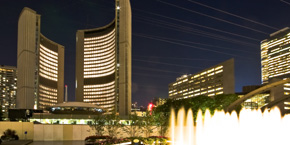After a 33-7 vote yesterday, Toronto City Council endorsed the Vienna Declaration, a document that denounces the war on drugs, the National Post reports.
The declaration favours public health responses to drugs instead of enforcement.
“The war against drugs has failed. In every jurisdiction and in every community, we know that policing this issue is not enough,” said gaybourhood councillor Kyle Rae.
Last year, controversy erupted during a Toronto safe consumption site feasibility study when Prime Minister Stephen Harper said he planned to shut down a Vancouver safe injection site.
The Vienna Declaration aims to end all that.
“The criminalization of illicit drug users is fuelling the HIV epidemic and has resulted in overwhelmingly negative health and social consequences. A full policy reorientation is needed.”
Approving the Vienna Declaration does not necessarily mean Toronto will have its own safe consumption site, says Councillor Gord Perks and Toronto Drug Strategy board chairperson.
“It’s a declaration, not a prescription. It would simply reinforce the existing Toronto Drug Strategy. For example, Public Health workers already hand out safe crack kits to prevent the spread of hepatitis and have numerous other programs for drug users,” says Perks.
In 2007, Shawn Syms wrote that embracing harm reduction could revitalize queer politics:
Law-enforcement officials will tell you drugs like crack are illegal because they’re harmful to users and society. But the reverse is even more true — some drug use is harmful specifically because of the fact that it’s against the law.
For instance, needle use can lead to many more health problems than inhaling a substance — such as abscesses, endocarditis (a potentially fatal heart infection) and a greater risk of overdose and death. But if you can be arrested for getting high, many people will choose the route least likely to be detected — and shooting up generates no telltale smoke or odours.
One of the biggest harms of all associated with addictive drugs is their economic cost. It’s easy to link illicit drug use and criminal acts such as theft — after all, both are considered morally suspect in the public imagination. But most addicts wouldn’t steal if illegal drugs — produced and distributed via underground economies fraught with risk — were not so unfairly expensive. In this way, drug laws set up a cycle of incarceration that wouldn’t otherwise exist.

COMPILED BY NEIL MCKINNON

 Why you can trust Xtra
Why you can trust Xtra


